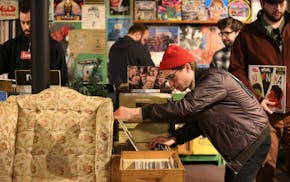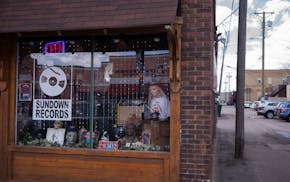Everyone knows guitar players can be a tad cocky. You heard the joke about how many of them it takes to screw in a lightbulb? (Ten -- one to do it and nine to say they could've done it better.)
Billy McLaughlin truly regrets having some of that ego in him. It made it all the more difficult to come to grips with a disease (focal dystonia) that caused immobility in his left hand and almost completely took away his ability to play the instrument he had long since mastered.
"It was a pretty humbling and desperate thing for me," McLaughlin remembered. "You take great pride in your work, and here you are not being able to do the things you used to be able to do. My family's income is built around me being able to play guitar."
Humility is hardly the hardest thing inflicted on the all-acoustic, New Age-y classical/jazz/rock instrumentalist, who specializes in fingertap-style guitar.
Since his 2001 diagnosis of dystonia -- a neurological disorder whose origins are still mysterious -- McLaughlin first tried to "play through it," he said. When gigs became too difficult, he made a more vocally driven, song-oriented CD with his band in 2003 that required less physical six-string technique. When even those songs became too difficult to play, he went three years without performing.
In the end, he had to accomplish the unthinkable for anyone who's ever played even simple riffs on guitar, much less McLaughlin's complex technique: He switched hands. His struggles are the subject of a new documentary movie, "Changing Keys," which he's screening at a concert tonight at the Parkway Theater in south Minneapolis (it's also scheduled to air April 19 on KTCA, Ch. 2), followed Saturday by another concert and a screening of a new orchestra-concert movie.
"I'm probably the only guitar player you've ever met who's had to learn how to play the guitar twice," he rightfully remarked two weeks ago.
Talking in his living room in White Bear Lake, where he lives with his teenage sons, Duncan and Blaze, the Minneapolis native recounted the arduous process of switching from right-handed to left-handed guitar. He said he hesitated to even consider the changeover.
"I'm kind of embarrassed how long it took me to look at my hands and go, 'Well, I'm only using this many fingers anyhow. If I could just transfer. ..."
McLaughlin can only use two fingers on his left hand (the one with which right-handed guitar players navigate the fingerboard), but there's nothing wrong with his right hand. Starting in 2003, he said, he would spend at least two to three hours per day practicing with the healthy hand as the lead. Even some of the most basic guitar work proved a great challenge.
"'Blackbird' by the Beatles is so hard," he said, "and yet, this kooky style that I had developed wound up being the doorway back to a career."
McLaughlin, 46, started out while still attending Washburn High School in south Minneapolis, playing funk and dance-oriented rock in a band called Paradox. ("Not the Paradox that became somewhat famous," he wryly noted, referring to the local '80s metal band.) He developed his unusual playing style in the mid-'80s after he graduated from the University of Southern California and spent a few more years in Los Angeles playing as a Larry Carlton/Stanley Jordan-style electric jazz guitarist.
The electric gigs were unplugged by a robbery, though, which left him without any of his instruments. Just as he would with dystonia years later, he improvised, buying an acoustic Martin (all he could afford) and moving back to Minnesota, where he began playing solo acoustic gigs.
After a decade of touring solo and with his namesake band, McLaughlin said he looked at the bright side of being forced off the road these past six years.
"Both my parents died in that time, which was a lot to deal with," he said. "And then, of course, I got to focus more on being a dad."
He is still trying to focus on the bright side, which doesn't sound easy. Therapies can help him deal with his dystonia, but barring any medical breakthroughs, his condition will never improve. It might even worsen. His healthy hand could become afflicted, too.
"If there's something I want to do with my music, I'd better do it now," he said bleakly. What's more, he admitted, "I'd say about 65 percent of the music I've written I'll never be able to play again."
The compositions he performs in concert now are the ones he believes he can still play in top form. He even believes he can play some better than before, plus he suggested that several of his new pieces are among his best yet.
"I have a diminished level of skills, but I'm using those skills at a higher level than before," he said. "The notes are such a challenge to play now, every note means that much more to me."
There he goes again, sounding cocky. For once, though, it's entirely welcome.
Rossum heading to NYC A true loss for the local jazz scene: Renowned trumpeter and instructor Kelly Rossum plans to pull up stakes and relocate to New York City near the end of summer, when his contract with MacPhail Center for Music is completed. Fortunately, he's maintaining his usual gig schedule in the meantime, including another show with the dazzling Pete Whitman X-tet at the Artists Quarter on Thursday.
Rossum said it was time to put aside teaching and try his luck in the Big Apple -- no matter how bad things bite right now. As he half-jokingly put it, "We're heading into a real depression, with a capital D, and I decide to quit my job and move to NYC to become a full-time jazz musician ... huh?!"
One upside of the bad economy, Rossum noted, is New York's real-estate prices have plummeted. Wouldn't it be poetic justice if a jazz player lands a sweet deal on an apartment vacated by a broker or banker?
Random mix The rare band whose story is interesting enough to merit a documentary film, Cloud Cult is offering local fans the first look at "No One Said It Would Be Easy," a new movie that chronicles the band's tragedy-tinged beginnings, its pioneering eco-friendly (and kid-friendly) tour practices and its uncommon stage show through interviews, concert footage and the artwork of onstage painter Scott West. The 100-minute film will be out on DVD April 21, but the band is hosting a screening Sunday at the Varsity Theater (6 p.m., $5), just a few days before it hits the road for a tour that ends at the Coachella Music Fest April 18. ...
It seems those Europeans love our scrappy Minnesotan pop/punkers. After a successful tour last summer (their first over there), the Magnolias are getting back together again for another Euro trek that kicks off next Friday in St. Etienne, France, and includes dates in Spain and Portugal. They're playing a sendoff gig Saturday in the Entry with Ten Ton Bridge and 10W40 (10 p.m., $8-$10; that's a lot of "10s"). ....
Hyder Ali's gig tonight with Mel Gibson & the Pants at the Turf Club is the release party for the hip-hop quartet's debut EP, "Careless Talk," which includes the Current-rotated single "Paper Dolls" and several more gritty, dark gems spearheaded by urgent-voiced frontman Eric Blair (10 p.m., $5). ...
A reminder: As you read this, 40-some local bands and yours tiredly are in the thick of the South by Southwest Music Conference in Austin, Texas. Go to startribune.com/sxsw for daily updates and videos with some of the acts down there.
chrisr@startribune.com • 612-673-4658
MUSIC BLOG: startribune.com/poplife

What to know and seek for Record Store Day 2024 in the Twin Cities

5 vinyl shops in greater Minnesota worth a spin for Record Store Day

Review: Sibling pop band AJR put on a fun show in St. Paul, but not a good concert

